Shelli R. Johannes's Blog, page 20
April 9, 2012
Guest Post: Doing Your Own Book Trailer (Rebekkah Ford)
I'm in the process of self-publishing my YA paranormal book, 'Beyond the Eyes,' and recently discovered I can make my own book trailer, which totally rocks. To be honest, though, I am less than proficient at computers. However, I think I can do this.
Seriously.
I think I can.
Yeah, I know. I sound like the little engine that could. But check this out so you can see why I think this.Oh, and as a side note, there are several ways you can make a book trailer. You can make it as an actual movie with actors portraying your characters, you can use animations, or you can use still photos, set to music with the storyline written on the photo, which is what I'm going to do.
My computer has the Windows Movie Maker software in it, and I've read that most computers do. If yours don't, I think you can download the program for free. There are other programs you can use as well, but I'm mentioning Windows Movie Maker because that's what I have.
Now obviously, I don't know the first thing about Windows Movie Maker, but that doesn't mean I can't learn on my own, right? There are YouTube videos on how to use the program. So after I have everything put together, I'm going to watch those videos, and then go into that program and play around with it until I know what I'm doing.
Once you decide to make a book trailer, here are the things you'll need to do first . . .
1.) Go to YouTube and watch the book trailers there so you have an idea on how it works and what other people have done. Take notes on your likes and dislikes. It'll help you generate ideas for your own book trailer. Pay attention to your feelings, and what type of music and pictures arouses the type of emotion(s) you're seeking to convey to your audience. Write it down because that's what you want. You want people who watch your book trailer to feel a connection with your character(s) and the story. Write ideas down for your own book trailer.
2.) Next step is selecting the pictures. There are free photo stock images out there that won't violate copyright laws. You can google "royalty free photo." Choose images that fit the theme and setting of your book. Save them in my picture's folder.
3.) Now you get to choose your music. I didn't know this until recently, but there's music available you can download for free without violating copyright laws.
How cool is that?
Like everything else, the selection of the type of music you're going to use is very important because it connects the audience with tone of your book, and hopefully stirs enough emotions, to get them to take interest in your book.
4.) Next is summarizing your plot. Honestly, I think that's going to be the hardest part. Right now, I'm still struggling with the blurb for the back of my book, so I'm guessing this might be a challenge as well. Just remember when you write the text for your book trailer, not to get too wordy. As long as you can put across the premise and characters of your book, you'll be fine. And of course, the text needs to match the pictures you put it on, but that's a given, right? It's not rocket science.
5.) And finally, you need to learn how Windows Movie Maker works and putting it all together.
And then . . .
Ta da!
You're all done.
Yay!
Now you have a book trailer you did all by yourself that you can be proud of, and is a great marketing tool for your book.
Contributor Bio
Rebekkah Ford grew up in a paranormal family. Her parents' Charles and Geri Wilhelm were the Directors of the UFO Investigators League in Fairfield, Ohio, back in the 1970s. They also investigated ghost hauntings and Bigfoot sightings in addition to UFO's. Growing up in this type of environment and having the passion for writing is what drove Rebekkah at an early age to write stories dealing with the paranormal. At one point in her life, she thought she wanted to be a journalist, and although she enjoyed writing articles, she quickly discovered her real passion was writing fiction. Her fascination with the paranormal is what led her to write the 'Beyond the Eyes' series. Visit her online and read her blog.http://feeds.feedburner.com/Faerialit...
Seriously.
I think I can.
Yeah, I know. I sound like the little engine that could. But check this out so you can see why I think this.Oh, and as a side note, there are several ways you can make a book trailer. You can make it as an actual movie with actors portraying your characters, you can use animations, or you can use still photos, set to music with the storyline written on the photo, which is what I'm going to do.
My computer has the Windows Movie Maker software in it, and I've read that most computers do. If yours don't, I think you can download the program for free. There are other programs you can use as well, but I'm mentioning Windows Movie Maker because that's what I have.
Now obviously, I don't know the first thing about Windows Movie Maker, but that doesn't mean I can't learn on my own, right? There are YouTube videos on how to use the program. So after I have everything put together, I'm going to watch those videos, and then go into that program and play around with it until I know what I'm doing.
Once you decide to make a book trailer, here are the things you'll need to do first . . .
1.) Go to YouTube and watch the book trailers there so you have an idea on how it works and what other people have done. Take notes on your likes and dislikes. It'll help you generate ideas for your own book trailer. Pay attention to your feelings, and what type of music and pictures arouses the type of emotion(s) you're seeking to convey to your audience. Write it down because that's what you want. You want people who watch your book trailer to feel a connection with your character(s) and the story. Write ideas down for your own book trailer.
2.) Next step is selecting the pictures. There are free photo stock images out there that won't violate copyright laws. You can google "royalty free photo." Choose images that fit the theme and setting of your book. Save them in my picture's folder.
3.) Now you get to choose your music. I didn't know this until recently, but there's music available you can download for free without violating copyright laws.
How cool is that?
Like everything else, the selection of the type of music you're going to use is very important because it connects the audience with tone of your book, and hopefully stirs enough emotions, to get them to take interest in your book.
4.) Next is summarizing your plot. Honestly, I think that's going to be the hardest part. Right now, I'm still struggling with the blurb for the back of my book, so I'm guessing this might be a challenge as well. Just remember when you write the text for your book trailer, not to get too wordy. As long as you can put across the premise and characters of your book, you'll be fine. And of course, the text needs to match the pictures you put it on, but that's a given, right? It's not rocket science.
5.) And finally, you need to learn how Windows Movie Maker works and putting it all together.
And then . . .
Ta da!
You're all done.
Yay!
Now you have a book trailer you did all by yourself that you can be proud of, and is a great marketing tool for your book.
Contributor Bio
Rebekkah Ford grew up in a paranormal family. Her parents' Charles and Geri Wilhelm were the Directors of the UFO Investigators League in Fairfield, Ohio, back in the 1970s. They also investigated ghost hauntings and Bigfoot sightings in addition to UFO's. Growing up in this type of environment and having the passion for writing is what drove Rebekkah at an early age to write stories dealing with the paranormal. At one point in her life, she thought she wanted to be a journalist, and although she enjoyed writing articles, she quickly discovered her real passion was writing fiction. Her fascination with the paranormal is what led her to write the 'Beyond the Eyes' series. Visit her online and read her blog.http://feeds.feedburner.com/Faerialit...
Published on April 09, 2012 06:00
April 6, 2012
Guest Post: The Art of Self Pubbing (Allison Moon)
By now it's old news that technology is allowing authors more control than ever over their work and their careers. The question remains, is all this control a good thing for authors?
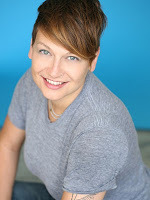 Six months ago, I self-published my first novel, Lunatic Fringe. I took the decision to go the indie route very seriously, and now that the chips have fallen and the book is alive in the world, I'm happy with my choice. Self-publishing worked for me because I chose it not only for the pragmatic reasons often cited in news stories and blogs. I believed that the indie route worked best for my personality, my book, and my ideology. If you're weighing your options, allow me to lay out 8 essential tenets I believe are key to finding true satisfaction in the self-publishing realm. There are dozens more variables to consider but I believe these will help you suss out your proclivities and maintain your integrity, ultimately providing more happiness with your choice.
Six months ago, I self-published my first novel, Lunatic Fringe. I took the decision to go the indie route very seriously, and now that the chips have fallen and the book is alive in the world, I'm happy with my choice. Self-publishing worked for me because I chose it not only for the pragmatic reasons often cited in news stories and blogs. I believed that the indie route worked best for my personality, my book, and my ideology. If you're weighing your options, allow me to lay out 8 essential tenets I believe are key to finding true satisfaction in the self-publishing realm. There are dozens more variables to consider but I believe these will help you suss out your proclivities and maintain your integrity, ultimately providing more happiness with your choice.
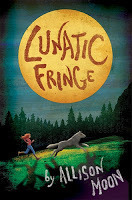 1) Do it for the right reasons
1) Do it for the right reasons
These may not include: desperation, boredom or fear of rejection. To be a writer is to deal with rejection, even if you forgo the gatekeepers completely. The real rejection, the kind that cuts more deeply than that from a jaded new york editor or agent, is the kind you'll get from readers. I've been lambasted by readers by not having a pro editor (I did), not proofreading (I did), making my book too niche (true, intentionally so), having too much sex (I humbly disagree), having icky sex (i.e. lesbian), having werewolf sex (which doesn't even happen in the book) taking too long to get to the story, spending too much time on the werewolves, and not enough time on the werewolves. These are just criticisms from the people who took the time to write reviews. There are undoubtedly more cutting comments to be found among those who didn't care to write a review. In real life I've also received the response of chilly silence. This is the reality of being a writer. For every reader who says you changed her life, there will be dozens more lining up to complain about the typo on page 189. If you can't handle rejection, you may need to work on your self-esteem before you put something so terribly intimate into the world as a book.
Likewise, many people are rushing to self publish out of a desperate need to be heard, or unload the manuscript thinking they'll make millions.
The fact is, there are ethical, ideological, and pragmatic reasons for self-publishing. Take some time to figure out why you're choosing it. If it's a last ditch effort after suffering hundreds of rejections, perhaps you should reevaulate the quality of your book to begin with. If you have a love for Maker Culture and the DIY aesthetic, you may be happier with the results of your efforts. I self-published because my book wasn't a sure thing by anyone's benchmarks, even small feminist publishing companies. I knew my book wouldn't sell enough to support a publishing company's bottom line, but I suspected it would do well enough to support me. And taking on the project from start to finish, preserving my radical politics, college setting, and odd stylistic choices worked well for me and my book. If you self-publish as a last ditch effort, that desperation will be visible to most people who see your book.
2) Do your research
The internet is full of free resources that will answer just about every question you have about indie publishing, and there are message boards full of kind, helpful writers who will fill in the blanks. After I self published my first novel, I fielded so many basic questions that I finally just combined everything I knew into a class I called Self-Publishing 101. I garnered most of the information from reading everything I could and then going through the process of self-publishing myself. You will still make silly, forehead slapping mistakes, but you'll make fewer of them. Because this is a new frontier, you have to learn constantly. Every day it seems like new products, software and distributors are cropping up. Do yourself the favor of staying abreast of these new developments in service of your story.
3) Learn how to write
I know this sounds redundant and trite, but it's true. I once met an author who bragged about going through his manuscript to change all the dialogue tags ("he said", "she asked") into more active verbs ("he intoned", "she inquired"). While on the surface this sounds okay, the most basic writing guides will tell you to avoid this. My writer friend thought he was making his book more sophisticated, when in reality he was making it far, far worse. I was addicted to adverbs, and some of the originals even squirmed their way into my final manuscript. Do your research. Most of it, again, is free on the internet. Follow blogs by writers you admire and take their advice. Some of it may annoy you, but like that 7th grade teacher we all had once said: Learn the rules first, then learn how to break them.
4) Enlist support
The worst mistake I see new self-publishers make is headstrong individualism. You get the idea that since you're "going it alone" in this blissfully defiant way, that you don't need help. You do. Trust me, you do. If you don't hire an editor, everyone will know. Okay, maybe a handful of easy-to-please readers won't care, but you might be surprised at how many people care a lot. Even a casual reader, after a lifetime of reading only professionally vetted and edited books will be annoyed by an unedited book, even if they don't know why.
This goes for covers, too. If you don't know what a Photoshop layer is, outsource your cover. You likely spent a lot of time writing your book. Why would you slap some stock image and bad font on the cover? Unprofessional covers are the biggest sign of a slap-dash book. Even if your book is perfectly crafted and miraculously told, a bad cover will reek of self-publishing stigma and will keep far too many people from buying your masterpiece.
5) Budget more time and money than you think you need
Paying your graphic designer by the hour? Double your budget for it. Think you'll be able to approve your proof right away? Spend a couple days rereading your book and give it to an eagle-eyed friend for typo proofing. You'll save yourself many headaches by padding your schedule.
6) Be honest
Transparency endears you to readers, and the internet will eventually figure out if you're lying. Grandstanding or bragging about the tons of money you've made or the stellar reviews you've received isn't going to impress anyone, especially if you're exaggerating or lying. You're not doing other striving authors any favors by overinflating the realities of self-publishing either. Publishing companies can find out exactly how many books you've really sold in about 30 seconds. Don't lie.
7) Love what you do
The #1 rule of marketing is to believe in your product. If you're embarrassed by your book cover or that chapter you really should've deleted, you'll never be able to pitch your book to potential readers with integrity. If you're ashamed of self-publishing, don't self-publish. The stigma of self-publishing is built on slap-dash, thoughtless books made by people who didn't care enough to do it right. Don't be one of those people. Be proud of your accomplishment and endeavor to improve with each book.
8) Play the Long Game
If you just want to get your book out into the world and never think about it again, you can. You probably won't make much money or build a career this way, but you can still do it. For me, I knew during the writing of my first novel that I was in love. I wanted to write more books, and I couldn't wait to finish one to move on to the next. After my first launch, there was a flurry of activity, but soon that died down and I had to focus on the future. Now, I'm working on the sequel to Lunatic Fringe, plus creating some smaller ebook projects on the side. This is my long game. Do you want to build a reputation with your work? Do you want to use your book to springboard to a new career? Do you want to explore different genres or teach others how to do what you did? All of these are options and self-publishing can help you get there, but to avoid the post-launch slump, you should have a bigger game than just one book. Whatever that game is, your book is a part of it, but just one part. Keep striving. Keep writing.
Contributor Bio:
Allison Moon is the author of the novel Lunatic Fringe, which can be summed up in two words: Lesbian Werewolves. When not working on the sequel, she teaches workshops on creativity, writing, & publishing. http://feeds.feedburner.com/Faerialit...
 Six months ago, I self-published my first novel, Lunatic Fringe. I took the decision to go the indie route very seriously, and now that the chips have fallen and the book is alive in the world, I'm happy with my choice. Self-publishing worked for me because I chose it not only for the pragmatic reasons often cited in news stories and blogs. I believed that the indie route worked best for my personality, my book, and my ideology. If you're weighing your options, allow me to lay out 8 essential tenets I believe are key to finding true satisfaction in the self-publishing realm. There are dozens more variables to consider but I believe these will help you suss out your proclivities and maintain your integrity, ultimately providing more happiness with your choice.
Six months ago, I self-published my first novel, Lunatic Fringe. I took the decision to go the indie route very seriously, and now that the chips have fallen and the book is alive in the world, I'm happy with my choice. Self-publishing worked for me because I chose it not only for the pragmatic reasons often cited in news stories and blogs. I believed that the indie route worked best for my personality, my book, and my ideology. If you're weighing your options, allow me to lay out 8 essential tenets I believe are key to finding true satisfaction in the self-publishing realm. There are dozens more variables to consider but I believe these will help you suss out your proclivities and maintain your integrity, ultimately providing more happiness with your choice.  1) Do it for the right reasons
1) Do it for the right reasonsThese may not include: desperation, boredom or fear of rejection. To be a writer is to deal with rejection, even if you forgo the gatekeepers completely. The real rejection, the kind that cuts more deeply than that from a jaded new york editor or agent, is the kind you'll get from readers. I've been lambasted by readers by not having a pro editor (I did), not proofreading (I did), making my book too niche (true, intentionally so), having too much sex (I humbly disagree), having icky sex (i.e. lesbian), having werewolf sex (which doesn't even happen in the book) taking too long to get to the story, spending too much time on the werewolves, and not enough time on the werewolves. These are just criticisms from the people who took the time to write reviews. There are undoubtedly more cutting comments to be found among those who didn't care to write a review. In real life I've also received the response of chilly silence. This is the reality of being a writer. For every reader who says you changed her life, there will be dozens more lining up to complain about the typo on page 189. If you can't handle rejection, you may need to work on your self-esteem before you put something so terribly intimate into the world as a book.
Likewise, many people are rushing to self publish out of a desperate need to be heard, or unload the manuscript thinking they'll make millions.
The fact is, there are ethical, ideological, and pragmatic reasons for self-publishing. Take some time to figure out why you're choosing it. If it's a last ditch effort after suffering hundreds of rejections, perhaps you should reevaulate the quality of your book to begin with. If you have a love for Maker Culture and the DIY aesthetic, you may be happier with the results of your efforts. I self-published because my book wasn't a sure thing by anyone's benchmarks, even small feminist publishing companies. I knew my book wouldn't sell enough to support a publishing company's bottom line, but I suspected it would do well enough to support me. And taking on the project from start to finish, preserving my radical politics, college setting, and odd stylistic choices worked well for me and my book. If you self-publish as a last ditch effort, that desperation will be visible to most people who see your book.
2) Do your research
The internet is full of free resources that will answer just about every question you have about indie publishing, and there are message boards full of kind, helpful writers who will fill in the blanks. After I self published my first novel, I fielded so many basic questions that I finally just combined everything I knew into a class I called Self-Publishing 101. I garnered most of the information from reading everything I could and then going through the process of self-publishing myself. You will still make silly, forehead slapping mistakes, but you'll make fewer of them. Because this is a new frontier, you have to learn constantly. Every day it seems like new products, software and distributors are cropping up. Do yourself the favor of staying abreast of these new developments in service of your story.
3) Learn how to write
I know this sounds redundant and trite, but it's true. I once met an author who bragged about going through his manuscript to change all the dialogue tags ("he said", "she asked") into more active verbs ("he intoned", "she inquired"). While on the surface this sounds okay, the most basic writing guides will tell you to avoid this. My writer friend thought he was making his book more sophisticated, when in reality he was making it far, far worse. I was addicted to adverbs, and some of the originals even squirmed their way into my final manuscript. Do your research. Most of it, again, is free on the internet. Follow blogs by writers you admire and take their advice. Some of it may annoy you, but like that 7th grade teacher we all had once said: Learn the rules first, then learn how to break them.
4) Enlist support
The worst mistake I see new self-publishers make is headstrong individualism. You get the idea that since you're "going it alone" in this blissfully defiant way, that you don't need help. You do. Trust me, you do. If you don't hire an editor, everyone will know. Okay, maybe a handful of easy-to-please readers won't care, but you might be surprised at how many people care a lot. Even a casual reader, after a lifetime of reading only professionally vetted and edited books will be annoyed by an unedited book, even if they don't know why.
This goes for covers, too. If you don't know what a Photoshop layer is, outsource your cover. You likely spent a lot of time writing your book. Why would you slap some stock image and bad font on the cover? Unprofessional covers are the biggest sign of a slap-dash book. Even if your book is perfectly crafted and miraculously told, a bad cover will reek of self-publishing stigma and will keep far too many people from buying your masterpiece.
5) Budget more time and money than you think you need
Paying your graphic designer by the hour? Double your budget for it. Think you'll be able to approve your proof right away? Spend a couple days rereading your book and give it to an eagle-eyed friend for typo proofing. You'll save yourself many headaches by padding your schedule.
6) Be honest
Transparency endears you to readers, and the internet will eventually figure out if you're lying. Grandstanding or bragging about the tons of money you've made or the stellar reviews you've received isn't going to impress anyone, especially if you're exaggerating or lying. You're not doing other striving authors any favors by overinflating the realities of self-publishing either. Publishing companies can find out exactly how many books you've really sold in about 30 seconds. Don't lie.
7) Love what you do
The #1 rule of marketing is to believe in your product. If you're embarrassed by your book cover or that chapter you really should've deleted, you'll never be able to pitch your book to potential readers with integrity. If you're ashamed of self-publishing, don't self-publish. The stigma of self-publishing is built on slap-dash, thoughtless books made by people who didn't care enough to do it right. Don't be one of those people. Be proud of your accomplishment and endeavor to improve with each book.
8) Play the Long Game
If you just want to get your book out into the world and never think about it again, you can. You probably won't make much money or build a career this way, but you can still do it. For me, I knew during the writing of my first novel that I was in love. I wanted to write more books, and I couldn't wait to finish one to move on to the next. After my first launch, there was a flurry of activity, but soon that died down and I had to focus on the future. Now, I'm working on the sequel to Lunatic Fringe, plus creating some smaller ebook projects on the side. This is my long game. Do you want to build a reputation with your work? Do you want to use your book to springboard to a new career? Do you want to explore different genres or teach others how to do what you did? All of these are options and self-publishing can help you get there, but to avoid the post-launch slump, you should have a bigger game than just one book. Whatever that game is, your book is a part of it, but just one part. Keep striving. Keep writing.
Contributor Bio:
Allison Moon is the author of the novel Lunatic Fringe, which can be summed up in two words: Lesbian Werewolves. When not working on the sequel, she teaches workshops on creativity, writing, & publishing. http://feeds.feedburner.com/Faerialit...
Published on April 06, 2012 06:00
April 4, 2012
Guest Post: Tackling Revisions (Robin Reul)
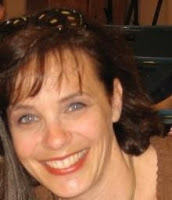 Tackling revision can be daunting, especially if you've already gone back into the work multiple times to make it shiny and sparkly. You've caught all those typos and grammatical errors, you've made sure your key plot points hit at certain places, you've ensured the stakes are high for your characters, what could there possibly be left to change??
Tackling revision can be daunting, especially if you've already gone back into the work multiple times to make it shiny and sparkly. You've caught all those typos and grammatical errors, you've made sure your key plot points hit at certain places, you've ensured the stakes are high for your characters, what could there possibly be left to change??And where do you begin? One of the best gifts you can give your revision is distance and time. The more time you have away from your story, the more you'll be able to come at it with fresh eyes and see what needs attention.
GET REACQUAINTED WITH YOUR STORY
The first thing I do when I revise is treat my book as I would any other book on the market. That is to say, I sit down and read it, preferably cover to cover if I can. I strongly advise printing it out or downloading it to an e-reader such as a Kindle or an iPad. It never ceases to amaze me how many times I can read the book on my computer, but whenever I read it in another form, I catch all sorts of things that aren't working. As you read your story, you will re-immerse yourself in the characters, their world, their dialogue, etc. For me, my natural inclination when I am done is to be able to dive back in and continue on because I am now reconnected to the story and reinvested in those characters. I also suggest reading it through a second time out loud, because that is often the best way to catch long rambling passages of dialogue, or extraneous scenes.
SET GROUND RULES AND REMOVE DISTRACTIONS
Revision, for me, requires total concentration in a different way than writing the actual story. I call it "entering the cave." In order to completely focus on the details of your work, establish basic ground rules with friends and family about getting in touch during the time you will be writing. I usually write from 8:30-2, while my kids are in school, so I ask that unless there is an emergency, please refrain from contacting me during that time unless it is truly essential. Turn off your phone ringer, don't log on to the internet and check your Facebook and Twitter feed, don't schedule lunches and coffee dates and other appointments that can pull you away and become easy excuses to procrastinate. Another thing I do is when I wake up, I start a load of laundry and do whatever dishes may be in the sink. Whatever I can get done housework-wise before I take my daughter to school is what gets done for that day. If I can get to more after my writing day, so be it, but that is my compromise to myself that I'm not just selfishly letting everything go. And if someone doesn't like that, hand them a duster with a smile.
TAKE YOUR TIME
Do not put yourself on a timetable for revision that is unrealistic (unless one has been imposed on you, obviously.) Revision takes time and requires precision and patience. You want to make sure to catch every small spelling, grammar and punctuation error possible, because these can be easy to miss and collectively add up to an unprofessional looking manuscript. Try and keep in mind that you have one shot with this book, whether it be with an agent considering representing you, or an editor considering it for publication, so you want this work to the the very best it can be. That takes time, and rushing the process so that you can feel like "something is happening" is only cheating yourself out of a great opportunity to make your work shine.
HAVE AN OPEN MIND
We all have a vision for how we want our story to read. However, be willing to keep an open mind when tackling revisions. Share your work with critique partners and listen honestly to their feedback. They may catch something you've never even considered, and it might take you down a new path entirely but it may be a path that makes your story far more interesting. I've said it in several posts here, but my general rule of thumb when it comes to feedback is if one person says it, I take it under consideration and read through the story with an eye for that element. However, if more than one person says it, I change it. Done deal. Because if more than one person says it, it is now an identifiable problem. It's hard to let go of our carefully crafted words, but sometimes it's necessary because it's simply not working.
MAKE NOTES OF YOUR CHANGES
This may seem like stating the obvious, but often we plunge forward making revisions without noting what we've changed. This is an important reference tool later because you may choose to bring some other element back in an edited form, or you may be making changes for an agent or editor and you will be able to let them know what those changes are specifically that you made and why. Obviously, saving older versions of your work is important, but you'd have to reread the older versions to get the complete sense of what has changed from draft to draft.
LISTEN TO YOUR STORY
After you complete each revision, take the time to read the story out loud anew. Even when you think you've covered all your bases, chances are, you will catch one or two more things that are tripping up the flow.
Any revision tips you can recommend? Good luck!
Contributor Bio:
Robin Reul is a contemporary YA author repped by Bill Contardi at Brandt & Hochman, and in her spare time she loves to foster her Facebook addiction, drink copious amounts of caffeine and enjoy her good standing as an equal opportunity cupcake lover. She lives in Southern CA with her husband and two kids. Her novel BAND GEEK is currently on submission after many, many, many revisions. Check out her blog.
http://feeds.feedburner.com/Faerialit...
Published on April 04, 2012 06:00
April 2, 2012
Guest Post: Finding Pockets of Writing Time (by Julie Duck)
The winner of my yascavengerhunt is Jenny at tea4my3@gmail.com. Please email me at shelli@srjohannes.com. You have 24 hours to claim.
Blue team winner is Jay Uppal from UK.
Today is the first day of guest posts covering me while I'm on vacation. Thank you to everyone who sent in posts. It was awesome. I will return to blogging Monday, April 16th.
Guest Post Schedule: 4/2 - Finding writing time (Julie Duck)4/4 - Tacking revisions (Robin reul)4/6 - The art of self pubbing (Allison Moon)4/9 - Book trailers (Becki)4/11 - Marketing postcards (Caroline Rose)4/13 - Link sharing in publicity (Imogen Reed)
==============
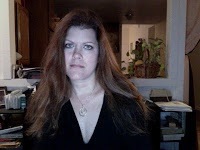 Finding Those Invisible Pockets of Writing Time
Finding Those Invisible Pockets of Writing Time
I know of several latent writers who sigh when I tell them I spent the night writing. They usually say, "I want to do that, but I don't have the time." I can relate to this statement, which is false, because I must have said it myself 255 times (oddball number for good measure) during the 20 years I spent not writing fiction.
Why is it false? Because there are pockets of time that writers can put their hands into, in order to get things done. Just like taking small steps toward a weight loss goal, a writer can accomplish a great deal by grasping the concept of "little bits" and making it work. Here are a few ways you can find those invisible pockets of time to concept, write, edit and swoon over your stories:
When the kids are taking a bath - You can sit in the bathroom with them, or nearby and hash out ideas and plots. You can even take your laptop or tablet in there with you, although I don't recommend it because bath time is often tsunami time as well.
Early in the morning – Okay, so you'll need to make an extra big pot of coffee and be "very, very quiet" to do this, but jumping out of bed to write can not only help you get that precious time in, but start your day on the "write" foot. I think it's better to write in the morning than exercise, much to my doctor's chagrin.
Lunch time – Why on earth would you want to write while you're trying to eat a sandwich and do it all in 60 minutes or less? Because writing is like eating – you have to do it. Your workday break can give you the pocket in which to put a few hundred words, a page here, a page there. It can only put you ahead (make sure you keep all sodas away from the keyboard).
In the dead of night – This is when I write, and I'll admit it is hard sometimes to sit down, clear out the mind and go for it. You might be tired, but there's no better way to wake up your brain than write at night. Plus, you can take the excitement of your story to bed with you, which serves to make you feel eager to do it again the next day. If you're lucky, you might even dream about what comes next in your story.
Waiting – Got a doctor's appointment? Writing is a better way to spend time in the lobby than reading a mottled copy of Good Housekeeping. Take a pad of paper with you, or your tablet. I've put more words down while waiting for medical tests and doctors than I can recall.
Most of all, don't stuff your pockets with monumental writing goals that make you feel pressured. If you tell yourself that it's "4,000 words a day or bust," you'll only feel like you can't do it, which is likely because, in reality, most of us cannot. Simply take things in stride, find the moments that work for getting the words in, and the story will unfold before your eyes.
Contributor Bio
Sometimes it takes a swift kick to start doing what you love. For Julie Rieman Duck, it was more like a full body slam. A health scare and loss of her editing job put Julie square in front of a choice: Do what I love, or do nothing? The decision to write again after 20 years of shelving her voice brought about edgy young adult novels, such as the recently released A Place In This Life and SWELL, little rooms and soon-to-be-released The Joy & Torture of Joshua James.
Today, Julie bounces between copywriting by day, fiction writing by night and never compromising her love for the written word. You can visit her at:Web site: www.julieduck.com
Blog: www.julieduck.wordpress.com
Twitter: skodobah
Goodreads: Julie Rieman Duck
http://feeds.feedburner.com/Faerialit...
Blue team winner is Jay Uppal from UK.
Today is the first day of guest posts covering me while I'm on vacation. Thank you to everyone who sent in posts. It was awesome. I will return to blogging Monday, April 16th.
Guest Post Schedule: 4/2 - Finding writing time (Julie Duck)4/4 - Tacking revisions (Robin reul)4/6 - The art of self pubbing (Allison Moon)4/9 - Book trailers (Becki)4/11 - Marketing postcards (Caroline Rose)4/13 - Link sharing in publicity (Imogen Reed)
==============
 Finding Those Invisible Pockets of Writing Time
Finding Those Invisible Pockets of Writing Time
I know of several latent writers who sigh when I tell them I spent the night writing. They usually say, "I want to do that, but I don't have the time." I can relate to this statement, which is false, because I must have said it myself 255 times (oddball number for good measure) during the 20 years I spent not writing fiction.
Why is it false? Because there are pockets of time that writers can put their hands into, in order to get things done. Just like taking small steps toward a weight loss goal, a writer can accomplish a great deal by grasping the concept of "little bits" and making it work. Here are a few ways you can find those invisible pockets of time to concept, write, edit and swoon over your stories:
When the kids are taking a bath - You can sit in the bathroom with them, or nearby and hash out ideas and plots. You can even take your laptop or tablet in there with you, although I don't recommend it because bath time is often tsunami time as well.
Early in the morning – Okay, so you'll need to make an extra big pot of coffee and be "very, very quiet" to do this, but jumping out of bed to write can not only help you get that precious time in, but start your day on the "write" foot. I think it's better to write in the morning than exercise, much to my doctor's chagrin.
Lunch time – Why on earth would you want to write while you're trying to eat a sandwich and do it all in 60 minutes or less? Because writing is like eating – you have to do it. Your workday break can give you the pocket in which to put a few hundred words, a page here, a page there. It can only put you ahead (make sure you keep all sodas away from the keyboard).
In the dead of night – This is when I write, and I'll admit it is hard sometimes to sit down, clear out the mind and go for it. You might be tired, but there's no better way to wake up your brain than write at night. Plus, you can take the excitement of your story to bed with you, which serves to make you feel eager to do it again the next day. If you're lucky, you might even dream about what comes next in your story.
Waiting – Got a doctor's appointment? Writing is a better way to spend time in the lobby than reading a mottled copy of Good Housekeeping. Take a pad of paper with you, or your tablet. I've put more words down while waiting for medical tests and doctors than I can recall.
Most of all, don't stuff your pockets with monumental writing goals that make you feel pressured. If you tell yourself that it's "4,000 words a day or bust," you'll only feel like you can't do it, which is likely because, in reality, most of us cannot. Simply take things in stride, find the moments that work for getting the words in, and the story will unfold before your eyes.
Contributor Bio
Sometimes it takes a swift kick to start doing what you love. For Julie Rieman Duck, it was more like a full body slam. A health scare and loss of her editing job put Julie square in front of a choice: Do what I love, or do nothing? The decision to write again after 20 years of shelving her voice brought about edgy young adult novels, such as the recently released A Place In This Life and SWELL, little rooms and soon-to-be-released The Joy & Torture of Joshua James.
Today, Julie bounces between copywriting by day, fiction writing by night and never compromising her love for the written word. You can visit her at:Web site: www.julieduck.com
Blog: www.julieduck.wordpress.com
Twitter: skodobah
Goodreads: Julie Rieman Duck
http://feeds.feedburner.com/Faerialit...
Published on April 02, 2012 06:00
March 29, 2012
YA Scavenger Hunt: Kimberly Derting (Blue Team)
 Welcome to YA Scavenger Hunt!
Welcome to YA Scavenger Hunt! This tri-annual event was first organized by author Colleen Houck to give readers a chance to gain access to exclusive bonus material from their favorite authors and win awesome prizes.
NOTE: I am also giving out my own special prizes below. So don't forget to enter here before you leave at a chance to win even more!
The YA Scavenger Hunt - Where do you go?
Go to the YA Scavenger Hunt page to find out all about the hunt. There are THREE contests going on simultaneously, and you can enter all three! I am a part of the BLUE team - but there is also a RED team and a YELLOW team. You can enter all three contests--which has a total prize bucket of 60 signed books!
Follow the hunt, collect clues, and add them up, and you can enter for the prize--one lucky winner will receive 20 signed books from each team (one book from each author on the team!) But play fast: this contest (and all the exclusive bonus material) will only be online for 72 hours!
 If you'd like to find out more about the hunt, see links to all the authors participating, and see the full list of prizes up for grabs, go to the YA Scavenger Hunt homepage.
If you'd like to find out more about the hunt, see links to all the authors participating, and see the full list of prizes up for grabs, go to the YA Scavenger Hunt homepage.Entering the Scavenger Hunt - What do you do?
Directions:
Hidden within this post is a single letter that is blue. Make a note of this letter! It's a part of a scrambled phrase you will need to win. When you go to all the author sites of the BLUE team, you'll have all the letters you need to enter the BLUE contest. Then if you have time, complete the same process for the RED team and YELLOW team.)
Entry Form:
Once you piece together all the clues to the BLUE hunt, make sure you fill out the form here to officially qualify for the grand prize. Only entries that have the completed phrase will qualify. You may enter all 3 hunts which means you will have to fill out the form 3 times.
Rules:
Open internationally, anyone below the age of 18 should have a parent or guardian's permission to enter. To be eligible for the grand prize, you must submit the completed entry form by April 1st at NOON PST. Entries sent without the correct puzzle code or without required information may not be considered.
BLUE TEAM SCAVENGER HUNT: Author Kimberly Derting
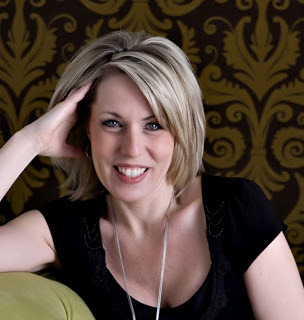 Today, I am hosting Kimberly Derting. She is the author of the BODY FINDER series (HarperCollins), which are as much coming-of-age romance as they are paranormal thrillers, as well as a new dystopic-fantasy trilogy, beginning with THE PLEDGE (S&S)
Today, I am hosting Kimberly Derting. She is the author of the BODY FINDER series (HarperCollins), which are as much coming-of-age romance as they are paranormal thrillers, as well as a new dystopic-fantasy trilogy, beginning with THE PLEDGE (S&S)She lives in the Pacific Northwest where the gloomy weather is ideal for writing anything dark and creepy. Her three beautiful (and often mouthy) children serve as an endless source of inspiration, and often find the things they say buried in the pages of their mother's books.
About The Last Echo (the 3rd book in Body Finder series):
In the end, all that's left is an echo…
Violet kept her morbid ability to sense dead bodies a secret from everyone except her family and her childhood-best-friend-turned-boyfriend, Jay Heaton. That is until forensic psychologist Sara Priest discovered Violet's talent and invited her to use her gift to track down murderers. Now, as she works with an eclectic group of individuals—including mysterious and dangerously attractive Rafe—it's Violet's job to help those who have been murdered by bringing their killers to justice. When Violet discovers the body of a college girl killed by "the girlfriend collector" she is determined to solve the case. But now the serial killer is on the lookout for a new "relationship" and Violet may have caught his eye....
Find out more information by checking out the author website or find more about the author's book here!
EXCLUSIVE CONTENT:The Bonus is a chapter from The Last Echo.
(hint, write this letter down!)
Open publication - Free publishing - More book
Continue on with the YA Scavenger Hunt for the BLUE TEAM by visiting Abbi Glines!
You can also enter my own giveaway by filling out the form below.
Good luck!
a Rafflecopter giveaway
<a href="http://rafl.es/enable-js"&am... need javascript enabled to see this giveaway</a>.
http://feeds.feedburner.com/Faerialit...
Published on March 29, 2012 12:00
March 27, 2012
YA Scavenger Hunt: Kimberly Derting

Welcome to YA Scavenger Hunt!
This tri-annual event was first organized by author Colleen Houck as a way to give readers a chance to gain access to exclusive bonus material from their favorite authors...and a chance to win some awesome prizes!
At this hunt, you not only get access to exclusive content from each author, you also get a clue for the hunt. Add up the clues, and you can enter for our prize--one lucky winner will receive 20 signed books, one book from each author on the hunt in my team! But play fast: this contest (and all the exclusive bonus material) will only be online for 72 hours!
 Go to the YA Scavenger Hunt page to find out all about the hunt. There are THREE contests going on simultaneously, and you can enter all three! I am a part of the BLUE team - but there is also a RED team and a YELLOW team. You can enter all three contests--which has a total prize bucket of 60 signed books!
Go to the YA Scavenger Hunt page to find out all about the hunt. There are THREE contests going on simultaneously, and you can enter all three! I am a part of the BLUE team - but there is also a RED team and a YELLOW team. You can enter all three contests--which has a total prize bucket of 60 signed books!If you'd like to find out more about the hunt, see links to all the authors participating, and see the full list of prizes up for grabs, go to the YA Scavenger Hunt homepage.
SCAVENGER HUNT PUZZLE
Directions: Hidden within my post is a single letter that is blue. Make a note of this letter! It's a part of a scrambled phrase you need to win. When you go to all the author sites of the BLUE team, you'll have all the letters you need to enter the contest. (this process also applies to RED team and YELLOW team)
Entry Form: Once you piece together all the clues to the blue hunt, make sure you fill out the form here to officially qualify for the grand prize. Only entries that have the completed phrase will qualify. You may enter all 3 hunts.
Rules: Open internationally, anyone below the age of 18 should have a parent or guardian's permission to enter. To be eligible for the grand prize, you must submit the completed entry form by April 1st at NOON PST. Entries sent without the correct puzzle code or without contact information will not be considered.
SCAVENGER HUNT POST
 Today, I am hosting Kimberly Derting for the YA Scavenger Hunt!
Today, I am hosting Kimberly Derting for the YA Scavenger Hunt!Kimberly is the author of the BODY FINDER series (HarperCollins), which are as much coming-of-age romance as they areparanormal thrillers, as well as a new dystopic-fantasy trilogy, beginning with THE PLEDGE (Simon & Schuster). She lives in the Pacific Northwestwhere the gloomy weather is ideal for writing anything dark and creepy. Herthree beautiful (and often mouthy) children serve as an endless source of inspiration, and often find the things they say buried in the pages of their mother's books.
About The Last Echo:
In the end, all that's left is an echo…
Violet kept her morbid ability to sense dead bodies a secret from everyone except her family and her childhood-best-friend-turned-boyfriend, Jay Heaton. That is until forensic psychologist Sara Priest discovered Violet's talent and invited her to use her gift to track down murderers. Now, as she works with an eclectic group of individuals—including mysterious and dangerously attractive Rafe—it's Violet's job to help those who have been murdered by bringing their killers to justice. When Violet discovers the body of a college girl killed by "the girlfriend collector" she is determined to solve the case. But now the serial killer is on the lookout for a new "relationship" and Violet may have caught his eye....
Find out more information by checking out the author website or find more about the author's book here!
EXCLUSIVE CONTENT:The Bonus is a chapter from The Last Echo.
Open publication - Free publishing - More book
Continue on with the YA Scavenger Hunt by visiting Abbi Glines!
Good luck!
http://feeds.feedburner.com/Faerialit...
Published on March 27, 2012 19:00
March 26, 2012
Creating an Online Media Kit
Today, I'm going to talk about creating a solid Media Kit, also called a Press kit.
I think you should have media kits posted online so they are easily downloadable and in paper so you can hand them out if you go to a school, library, or bookstore.
You don't have to be published to do this. Self pubbed authors should absolutely do this (especially online) and pre-published authors can get ahead of the game! You never know. A media kit on your web site may even help you sell your book if an agent or editor comes across it. You would just have less items than a published author.
In Guerrilla Marketing, it says the key to approaching the media, is to have the right materials in place to make it easy for placement. Books, web site, and media kit.
Tips on Creating Your Media Kit Your media kit should be accessible online. That way you can mail it out or email a link. You need to have everything easily available for editors or reviewers in case they don't want or need to contact you personally. All this information will convince them to interview you.
This is the first impression they have of you so make it good, professional, and of high quality. It is better to do a few things great than a lot of things mediocre. It can make the difference!
Make sure you keep your information current. A lot of authors forget to update their information.
Color (good quality) is usually more eye catching than B/W
You should have a menu item on your web site. A lot of people won't take the time to search - if it is not right there. So make it easy to find.
Must Haves of Online Media Kit
* indicates what a prepublished author can include (1-5)An author photo - high res is important.*
A short bio *
One page book synopsis *
List of basic interview questions and questions (FAQs) - get to know you type stuff *
Updated author contact information including social networks *
Any links to articles or reviews or other interviews (actual documents would be better b/c links to other sites can change)
A one page press release on your book - update this quarterly with recent news - maybe including new reviews, printing releases, upcoming milestones (Go to prnews.com for some samples).
Link to Tour dates/signings/speaking engagements
Book cover file - high res
Page of praises/reviews on your book
Nice To Haves (Especially in this age of technology) Video, audio, even a VLOG of you talking at signing or in interview - optional but I think in this day and age any technology is ideal
Book Trailer
Podcasts
Recommended List of speaking topics
Recommended List of pre-answered interview questions
Mail-out Media Try to use special folders. Glossy is preferred. Double pocket with biz card window. yellow, white or grey manila folders are not OK
Cover letter - be professional - include project pitch, bio, and how you can benefit them (like a longer query letter)
Business cards - do NOT print off your own. Make them nice.
Order stickers for front - maybe book cover or other art. You can get folders and labels customized at VistaPrint.
Be sure everything is branded to be in alignment with either your author brand or book brand. For example: use the same colors as your book or web site.)
You can add in cds or dvd's of book trailers or videos. Also include any pdfs of covers and head shots - you can even print them on nice photo paper.
Any copies of newspapers, articles, interviews etc
Always do your research, make a few calls to be sure you get your kit to the right person if you are mailing it out.
Save your media kits (because they cost money to put together) for higher profile visits.
Some great articles on creating media kits
Online Media Kit The ultimate PR toolAn author's press kit
Great Media Examples: Tricia Goyer
Yasmine Galenorn
Alyson Noel
Sarah Dessen
Sarah Beth Durst
Let me know if you have questions....http://feeds.feedburner.com/Faerialit...
I think you should have media kits posted online so they are easily downloadable and in paper so you can hand them out if you go to a school, library, or bookstore.
You don't have to be published to do this. Self pubbed authors should absolutely do this (especially online) and pre-published authors can get ahead of the game! You never know. A media kit on your web site may even help you sell your book if an agent or editor comes across it. You would just have less items than a published author.
In Guerrilla Marketing, it says the key to approaching the media, is to have the right materials in place to make it easy for placement. Books, web site, and media kit.
Tips on Creating Your Media Kit Your media kit should be accessible online. That way you can mail it out or email a link. You need to have everything easily available for editors or reviewers in case they don't want or need to contact you personally. All this information will convince them to interview you.
This is the first impression they have of you so make it good, professional, and of high quality. It is better to do a few things great than a lot of things mediocre. It can make the difference!
Make sure you keep your information current. A lot of authors forget to update their information.
Color (good quality) is usually more eye catching than B/W
You should have a menu item on your web site. A lot of people won't take the time to search - if it is not right there. So make it easy to find.
Must Haves of Online Media Kit
* indicates what a prepublished author can include (1-5)An author photo - high res is important.*
A short bio *
One page book synopsis *
List of basic interview questions and questions (FAQs) - get to know you type stuff *
Updated author contact information including social networks *
Any links to articles or reviews or other interviews (actual documents would be better b/c links to other sites can change)
A one page press release on your book - update this quarterly with recent news - maybe including new reviews, printing releases, upcoming milestones (Go to prnews.com for some samples).
Link to Tour dates/signings/speaking engagements
Book cover file - high res
Page of praises/reviews on your book
Nice To Haves (Especially in this age of technology) Video, audio, even a VLOG of you talking at signing or in interview - optional but I think in this day and age any technology is ideal
Book Trailer
Podcasts
Recommended List of speaking topics
Recommended List of pre-answered interview questions
Mail-out Media Try to use special folders. Glossy is preferred. Double pocket with biz card window. yellow, white or grey manila folders are not OK
Cover letter - be professional - include project pitch, bio, and how you can benefit them (like a longer query letter)
Business cards - do NOT print off your own. Make them nice.
Order stickers for front - maybe book cover or other art. You can get folders and labels customized at VistaPrint.
Be sure everything is branded to be in alignment with either your author brand or book brand. For example: use the same colors as your book or web site.)
You can add in cds or dvd's of book trailers or videos. Also include any pdfs of covers and head shots - you can even print them on nice photo paper.
Any copies of newspapers, articles, interviews etc
Always do your research, make a few calls to be sure you get your kit to the right person if you are mailing it out.
Save your media kits (because they cost money to put together) for higher profile visits.
Some great articles on creating media kits
Online Media Kit The ultimate PR toolAn author's press kit
Great Media Examples: Tricia Goyer
Yasmine Galenorn
Alyson Noel
Sarah Dessen
Sarah Beth Durst
Let me know if you have questions....http://feeds.feedburner.com/Faerialit...
Published on March 26, 2012 07:30
March 21, 2012
Bookanistas: Christins Fonseca (Lacrimosa)
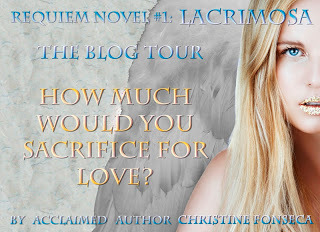 Congrads to Christine for her debut Young Adult Lacrimosa. (doesn't it sound like a nice cool drink!)
Congrads to Christine for her debut Young Adult Lacrimosa. (doesn't it sound like a nice cool drink!)Today, I'm hosting a stop on her blog tour to celebrate Lacrimosa.
Before we hear some scoop from Christine, here is the 411 on her book.
As if casting out demons isn't hard enough, five-hundred-year-old Nesy has to masquerade as a teenage girl to do it. Nesy is the best of the warrior angels called Sentinals. She never makes mistakes, never hesitates, never gets emotionally involved. Until she meets Aydan.
He is evil incarnate; a fallen angel that feeds off the souls of others. Everything Nesy is supposed to hate. But she can't, because he's also the love of her former life as a human girl—a life that ended too soon, tying her to emotions she was never supposed to feel. Now Nesy must choose between doing her duty—damning Aydan to the fiery depths of hell—or saving him, and condemning herself.
"LACRIMOSA reaches out, grabs readers by the heart, and takes them on an emotional journey from the first page to the last. The last novel you'll need to read to understand true sacrifice."~Elana Johnson, Author of POSSESSION
===============
Thanks Shelli for hosting a stop on the blog tour celebrating the release of LACRIMOSA. Since this week is "Getting to Know Aydan" week, I thought I'd share a little bit about him and, more importantly, how I "found" him.
LACRIMOSA was first conceptualized during Nanowrimo 2008, while I was working on another project. It wasn't drafted, however, until much later - August 2009 to be exact. Although I drafted it relatively quickly, it took much longer for me to edit it and get it ready for the world. Even after I thought it was ready, I revised significantly throughout the querying and acquisition process. And again once it was sold.
But let me back up and focus on one particular aspect of the story - Aydan. I had a "sense" of Aydan from the very beginning; knew that he was a tortured soul in love. Knew that it was that love that would both redeem and kill him.
I had a sense of his looks and demeanor. But that was it.
Over the course of 5 substantial rewrites I found his voice. Literally. See, the book started off in third person, told from Nesy's POV. Rewrite #1 added a POV - Aydan's. Rewrite #2 added another POV. Rewrites #3 and 4 changed it yet again, moving from third into first, and past tense into present. With each rewrite I got to know Aydan a little more, got a chance to peek into his heart and mind and see all the layers of him. By the time I finished with rewrite #5, I knew Aydan. Profoundly. Had I not been willing to go back to the beginning, start over and experiment with different things in order to get the story where it needed to be...
Had I not been tenacious and resolute in my wish to craft the authentic story that existed deep within my heart...
Had I not bravely gone where Aydan wanted me to go, I never would have found him; never would have be able to craft his voice. Hopefully the connection I found will be one you will find when reading LACRIMOSA .
Hopefully.
Now, don't forget to enter the contest for fabulous AYDAN inspired books and swag. Just complete the form.
<p>&amp;amp;amp;lt;p&amp;amp;amp;gt;&amp;amp;amp;amp;amp;amp;amp;lt;p&amp;amp;amp;amp;amp;amp;amp;gt;&amp;amp;amp;amp;amp;amp;amp;amp;amp;amp;amp;amp;&amp;amp;amp;amp;amp;amp;lt;span class="goog-spellcheck-word" style="background-image: initial; background-attachment: initial; background-origin: initial; background-clip: initial; background-color: yellow; background-position: initial initial; background-repeat: initial initial; "&amp;amp;amp;amp;amp;amp;gt;lt&amp;amp;amp;amp;amp;amp;lt;/span&amp;amp;amp;amp;amp;amp;gt;;p&amp;amp;amp;amp;amp;amp;amp;amp;amp;amp;amp;amp;gt;&amp;amp;amp;amp;amp;amp;amp;amp;amp;amp;amp;amp;amp;amp;amp;amp;amp;&amp;amp;amp;amp;amp;amp;lt;span class="goog-spellcheck-word" style="background-image: initial; background-attachment: initial; background-origin: initial; background-clip: initial; background-color: yellow; background-position: initial initial; background-repeat: initial initial; "&amp;amp;amp;amp;amp;amp;gt;lt&amp;amp;amp;amp;amp;amp;lt;/span&amp;amp;amp;amp;amp;amp;gt;;p&amp;amp;amp;amp;amp;amp;amp;amp;amp;amp;amp;amp;amp;amp;amp;amp;amp;gt;&amp;amp;amp;amp;amp;amp;amp;amp;amp;amp;amp;amp;amp;amp;amp;amp;amp;amp;amp;amp;amp;&amp;amp;amp;amp;amp;amp;lt;span class="goog-spellcheck-word" style="background-image: initial; background-attachment: initial; background-origin: initial; background-clip: initial; background-color: yellow; background-position: initial initial; background-repeat: initial initial; "&amp;amp;amp;amp;amp;amp;gt;lt&amp;amp;amp;amp;amp;amp;lt;/span&amp;amp;amp;amp;amp;amp;gt;;p&amp;amp;amp;amp;amp;amp;amp;amp;amp;amp;amp;amp;amp;amp;amp;amp;amp;amp;amp;amp;amp;gt;&amp;amp;amp;amp;amp;amp;amp;amp;amp;amp;amp;amp;amp;amp;amp;amp;amp;amp;amp;amp;amp;amp;amp;amp;amp;&amp;amp;amp;amp;amp;amp;lt;span class="goog-spellcheck-word" style="background-image: initial; background-attachment: initial; background-origin: initial; background-clip: initial; background-color: yellow; background-position: initial initial; background-repeat: initial initial; "&amp;amp;amp;amp;amp;amp;gt;lt&amp;amp;amp;amp;amp;amp;lt;/span&amp;amp;amp;amp;amp;amp;gt;;p&amp;amp;amp;amp;amp;amp;amp;amp;amp;amp;amp;amp;amp;amp;amp;amp;amp;amp;amp;amp;amp;amp;amp;amp;amp;gt;&amp;amp;amp;amp;amp;amp;amp;amp;amp;amp;amp;amp;amp;amp;amp;amp;amp;amp;amp;amp;amp;amp;amp;amp;amp;amp;amp;amp;amp;&amp;amp;amp;amp;amp;amp;lt;span class="goog-spellcheck-word" style="background-image: initial; background-attachment: initial; background-origin: initial; background-clip: initial; background-color: yellow; background-position: initial initial; background-repeat: initial initial; "&amp;amp;amp;amp;amp;amp;gt;lt&amp;amp;amp;amp;amp;amp;lt;/span&amp;amp;amp;amp;amp;amp;gt;;p&amp;amp;amp;amp;amp;amp;amp;amp;amp;amp;amp;amp;amp;amp;amp;amp;amp;amp;amp;amp;amp;amp;amp;amp;amp;amp;amp;amp;amp;gt;&amp;amp;amp;amp;amp;amp;amp;amp;amp;amp;amp;amp;amp;amp;amp;amp;amp;amp;amp;amp;amp;amp;amp;amp;amp;amp;amp;amp;amp;amp;amp;amp;amp;&amp;amp;amp;amp;amp;amp;lt;span class="goog-spellcheck-word" style="background-image: initial; background-attachment: initial; background-origin: initial; background-clip: initial; background-color: yellow; background-position: initial initial; background-repeat: initial initial; "&amp;amp;amp;amp;amp;amp;gt;lt&amp;amp;amp;amp;amp;amp;lt;/span&amp;amp;amp;amp;amp;amp;gt;;p&amp;amp;amp;amp;amp;amp;amp;amp;amp;amp;amp;amp;amp;amp;amp;amp;amp;amp;amp;amp;amp;amp;amp;amp;amp;amp;amp;amp;amp;amp;amp;amp;amp;gt;&amp;amp;amp;amp;amp;amp;amp;amp;amp;amp;amp;amp;amp;amp;amp;amp;amp;amp;amp;amp;amp;amp;amp;amp;amp;amp;amp;amp;amp;amp;amp;amp;amp;amp;amp;amp;amp;&amp;amp;amp;amp;amp;amp;lt;span class="goog-spellcheck-word" style="background-image: initial; background-attachment: initial; background-origin: initial; background-clip: initial; background-color: yellow; background-position: initial initial; background-repeat: initial initial; "&amp;amp;amp;amp;amp;amp;gt;lt&amp;amp;amp;amp;amp;amp;lt;/span&amp;amp;amp;amp;amp;amp;gt;;p&amp;amp;amp;amp;amp;amp;amp;amp;amp;amp;amp;amp;amp;amp;amp;amp;amp;amp;amp;amp;amp;amp;amp;amp;amp;amp;amp;amp;amp;amp;amp;amp;amp;amp;amp;amp;amp;gt;&amp;amp;amp;amp;amp;amp;amp;amp;amp;amp;amp;amp;amp;amp;amp;amp;amp;amp;amp;amp;amp;amp;amp;amp;amp;amp;amp;amp;amp;amp;amp;amp;amp;amp;amp;amp;amp;amp;amp;amp;amp;&amp;amp;amp;amp;amp;amp;lt;span class="goog-spellcheck-word" style="background-image: initial; background-attachment: initial; background-origin: initial; background-clip: initial; background-color: yellow; background-position: initial initial; background-repeat: initial initial; "&amp;amp;amp;amp;amp;amp;gt;lt&amp;amp;amp;amp;amp;amp;lt;/span&amp;amp;amp;amp;amp;amp;gt;;p&amp;amp;amp;amp;amp;amp;amp;amp;amp;amp;amp;amp;amp;amp;amp;amp;amp;amp;amp;amp;amp;amp;amp;amp;amp;amp;amp;amp;amp;amp;amp;amp;amp;amp;amp;amp;amp;amp;amp;amp;amp;gt;Loading...&amp;amp;amp;amp;amp;amp;amp;amp;amp;amp;amp;amp;amp;amp;amp;amp;amp;amp;amp;amp;amp;amp;amp;amp;amp;amp;amp;amp;amp;amp;amp;amp;amp;amp;amp;amp;amp;amp;amp;amp;amp;&amp;amp;amp;amp;amp;amp;lt;span class="goog-spellcheck-word" style="background-image: initial; background-attachment: initial; background-origin: initial; background-clip: initial; background-color: yellow; background-position: initial initial; background-repeat: initial initial; "&amp;amp;amp;amp;amp;amp;gt;lt&amp;amp;amp;amp;amp;amp;lt;/span&amp;amp;amp;amp;amp;amp;gt;&amp;amp;amp;amp;amp;amp;lt;span class="goog-spellcheck-word" style="background-image: initial; background-attachment: initial; background-origin: initial; background-clip: initial; background-color: yellow; background-position: initial initial; background-repeat: initial initial; "&amp;amp;amp;amp;amp;amp;gt;lt&amp;amp;amp;amp;amp;amp;lt;/span&amp;amp;amp;amp;amp;amp;gt;;/p&amp;amp;amp;amp;amp;amp;amp;amp;amp;amp;amp;amp;amp;amp;amp;amp;amp;amp;amp;amp;amp;amp;amp;amp;amp;amp;amp;amp;amp;amp;amp;amp;amp;amp;amp;amp;amp;gt;&amp;amp;amp;amp;amp;amp;amp;amp;amp;amp;amp;amp;amp;amp;amp;amp;amp;amp;amp;amp;amp;amp;amp;amp;amp;amp;amp;amp;amp;amp;amp;amp;amp;&amp;amp;amp;amp;amp;amp;lt;span class="goog-spellcheck-word" style="background-image: initial; background-attachment: initial; background-origin: initial; background-clip: initial; background-color: yellow; background-position: initial initial; background-repeat: initial initial; "&amp;amp;amp;amp;amp;amp;gt;lt&amp;amp;amp;amp;amp;amp;lt;/span&amp;amp;amp;amp;amp;amp;gt;;/p&amp;amp;amp;amp;amp;amp;amp;amp;amp;amp;amp;amp;amp;amp;amp;amp;amp;amp;amp;amp;amp;amp;amp;amp;amp;amp;amp;amp;amp;amp;amp;amp;amp;gt;&amp;amp;amp;amp;amp;amp;amp;amp;amp;amp;amp;amp;amp;amp;amp;amp;amp;amp;amp;amp;amp;amp;amp;amp;amp;amp;amp;amp;amp;&amp;amp;amp;amp;amp;amp;lt;span class="goog-spellcheck-word" style="background-image: initial; background-attachment: initial; background-origin: initial; background-clip: initial; background-color: yellow; background-position: initial initial; background-repeat: initial initial; "&amp;amp;amp;amp;amp;amp;gt;lt&amp;amp;amp;amp;amp;amp;lt;/span&amp;amp;amp;amp;amp;amp;gt;;/p&amp;amp;amp;amp;amp;amp;amp;amp;amp;amp;amp;amp;amp;amp;amp;amp;amp;amp;amp;amp;amp;amp;amp;amp;amp;amp;amp;amp;amp;gt;&amp;amp;amp;amp;amp;amp;amp;amp;amp;amp;amp;amp;amp;amp;amp;amp;amp;amp;amp;amp;amp;amp;amp;amp;amp;&amp;amp;amp;amp;amp;amp;lt;span class="goog-spellcheck-word" style="background-image: initial; background-attachment: initial; background-origin: initial; background-clip: initial; background-color: yellow; background-position: initial initial; background-repeat: initial initial; "&amp;amp;amp;amp;amp;amp;gt;lt&amp;amp;amp;amp;amp;amp;lt;/span&amp;amp;amp;amp;amp;amp;gt;;/p&amp;amp;amp;amp;amp;amp;amp;amp;amp;amp;amp;amp;amp;amp;amp;amp;amp;amp;amp;amp;amp;amp;amp;amp;amp;gt;&amp;amp;amp;amp;amp;amp;amp;amp;amp;amp;amp;amp;amp;amp;amp;amp;amp;amp;amp;amp;amp;&amp;amp;amp;amp;amp;amp;lt;span class="goog-spellcheck-word" style="background-image: initial; background-attachment: initial; background-origin: initial; background-clip: initial; background-color: yellow; background-position: initial initial; background-repeat: initial initial; "&amp;amp;amp;amp;amp;amp;gt;lt&amp;amp;amp;amp;amp;amp;lt;/span&amp;amp;amp;amp;amp;amp;gt;;/p&amp;amp;amp;amp;amp;amp;amp;amp;amp;amp;amp;amp;amp;amp;amp;amp;amp;amp;amp;amp;amp;gt;&amp;amp;amp;amp;amp;amp;amp;amp;amp;amp;amp;amp;amp;amp;amp;amp;amp;&amp;amp;amp;amp;amp;amp;lt;span class="goog-spellcheck-word" style="background-image: initial; background-attachment: initial; background-origin: initial; background-clip: initial; background-color: yellow; background-position: initial initial; background-repeat: initial initial; "&amp;amp;amp;amp;amp;amp;gt;lt&amp;amp;amp;amp;amp;amp;lt;/span&amp;amp;amp;amp;amp;amp;gt;;/p&amp;amp;amp;amp;amp;amp;amp;amp;amp;amp;amp;amp;amp;amp;amp;amp;amp;gt;&amp;amp;amp;amp;amp;amp;amp;amp;amp;amp;amp;amp;&amp;amp;amp;amp;amp;amp;lt;span class="goog-spellcheck-word" style="background-image: initial; background-attachment: initial; background-origin: initial; background-clip: initial; background-color: yellow; background-position: initial initial; background-repeat: initial initial; "&amp;amp;amp;amp;amp;amp;gt;lt&amp;amp;amp;amp;amp;amp;lt;/span&amp;amp;amp;amp;amp;amp;gt;;/p&amp;amp;amp;amp;amp;amp;amp;amp;amp;amp;amp;amp;gt;&amp;amp;amp;amp;amp;amp;amp;lt;/p&amp;amp;amp;amp;amp;amp;amp;gt;&amp;amp;amp;lt;/p&amp;amp;amp;gt;</p>
You can enter up to twice daily (through the tour and my blog).
And there's more - continue to collect the daily clues to enter the EPIC grand prize giveaway that includes books, swag and a special surprise.
Today's clue - LORI.
Missed out on any of the tour? Click over to the schedule to make sure you've hit all the stops, seen or read the posts, entered the giveaways, and collected the clues. More great things are coming next week as well. EEP!!!
More Book Information
Publisher: COMPASS PRESS
ISBN: 0984786368 (ISBN 13: 9780984786367)
Hardback and Digital formats from Amazon, Barnes and Noble and fine retailers.
Kindle ebook
Nook buy link -
Book trailer can be seen by linking to YouTube -
Additional Titles in the series include DIES IRAE (a Requiem Novella), LIBERA ME (Oct 2012) and REQUIEM (March 2013).
====================
 Check out other awesome Bookanista posts!
Check out other awesome Bookanista posts!Christine Fonseca is awed by A TEMPTATION OF ANGELS
Stasia Ward Kehoe shares some scoop on DEAR TEEN ME
Debra Driza swoons for SLIDE
Katy Upperman praises PANDEMONIUM
Tracy Banghart thinks SCARLET is spectacular
Gennifer Albin brings you her Bologna trendwatch
Jessica Love sings for NEVERSINK – with giveaway!
http://feeds.feedburner.com/Faerialit...
Published on March 21, 2012 15:18
March 19, 2012
YA Scavenger Hunt with 60 authors - March 29 - April 1!
 It's time to announce the final lineup of the Spring Scavenger Hunt hosted by Colleen Houck, author of Tiger Curse series!
It's time to announce the final lineup of the Spring Scavenger Hunt hosted by Colleen Houck, author of Tiger Curse series! I was chosen this year to be a part of it and I am thrilled!
This year it will be bigger and badder than ever before with 60 YA authors! They will be giving away books and sharing EXCLUSIVE content.With fabulous prizes around every corner - you DO NOT want to miss this!
My friend and bestselling author Beth Revis has worked with Colleen Houck to create a website just for the Scavenger Hunts! The 60 authors are breaking into three groups of 20: BLUE TEAM, RED TEAM, and YELLOW TEAM!
There will be 3 puzzles, 1 for each team. Each puzzle is a scrambled phrase with a total of twenty letters. You can follow 1 team to win or all 3!! And if you get lost along the way, just keep going back to the main page to get caught up.
I am on the BLUE team with amazing authors like which means all my prizes and exclusives will be on the BLUE team. The BLUE TEAM includes authors: KIMBERLY DERTING, CHRISTINE FONSECA, ABBI GLINES, CYNTHIA HAND, KAREN AMANDA HOOPER, S.R. JOHANNES, GRETCHEN MCNEIL, JESSICA SHIRVINGTON AND many many more.
I will be revealing my 1st chapter of Uncontrollable (sequel to Untraceable) as well as offering a couple of EXCLUSIVE giveaways to my followers.
THE YA SCAVENGER HUNT BEGINS THURSDAY MARCH 29TH AT NOON PACIFIC TIME AND ENDS SUNDAY APRIL 1ST AT NOON PACIFIC TIME!
THAT GIVES YOU ONLY 72 HOURS TO COMPLETE THE HUNT!
GOOD LUCK TO ALL!http://feeds.feedburner.com/Faerialit...
Published on March 19, 2012 09:23
March 17, 2012
Cool 'Hunger Games' Stuff
Are you as excited as 1/2 the world about Hunger Games? I have my tickets for next weekend and my t-shirt is on the way.
So you can imagine how awesome it was to have my book Untraceable compared to Hunger Games - in any way! And I do see Grace as a modern day Katniss. Or at least that is what I wanted to create.
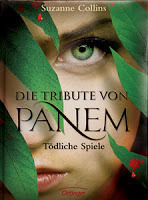
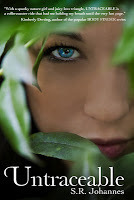
A fan of Untraceable who loved my cover mentioned it's resemblence to Hunger Games. How spooky is that! I've never seen the Germany cover before this and look our much they compliment each other.
Reel Life talks about How Grace is Like a Contemporary Katniss
Or when this reader said this: "Untraceable reminded me of a non-science fiction/non-fantasy version of The Hunger Games or The Calling by Kelley Armstrong. Lots of outdoorsy stuff, lots of mystery, lots of action. is :)"
So, here are some great things I found that are fun to help you get ready for next weekend:
Movie Stuff
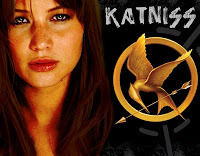
Katniss Archery Training trailer
Movie Trailers/Songs
Writer Stuff
Interview with Suzanne Collins
Interview with Suzanne on writing
Suzanne at the Premiere
Interview with Stacy Egan - Hunger Games editor
Suzanne on Writing
Extras/Fun Stuff
Find great gifts for Hunger Game Fans - tshirts or jewelry
Hunger Games 4th Book - Tribute Guide
Articles
Why Hunger Games will be Bigger than Twilight
People's Inside Hunger Games
Why Hunger Games is Good for This Generation
Families Bonding over Hunger Gameshttp://feeds.feedburner.com/Faerialit...
So you can imagine how awesome it was to have my book Untraceable compared to Hunger Games - in any way! And I do see Grace as a modern day Katniss. Or at least that is what I wanted to create.


A fan of Untraceable who loved my cover mentioned it's resemblence to Hunger Games. How spooky is that! I've never seen the Germany cover before this and look our much they compliment each other.
Reel Life talks about How Grace is Like a Contemporary Katniss
Or when this reader said this: "Untraceable reminded me of a non-science fiction/non-fantasy version of The Hunger Games or The Calling by Kelley Armstrong. Lots of outdoorsy stuff, lots of mystery, lots of action. is :)"
So, here are some great things I found that are fun to help you get ready for next weekend:
Movie Stuff

Katniss Archery Training trailer
Movie Trailers/Songs
Writer Stuff
Interview with Suzanne Collins
Interview with Suzanne on writing
Suzanne at the Premiere
Interview with Stacy Egan - Hunger Games editor
Suzanne on Writing
Extras/Fun Stuff
Find great gifts for Hunger Game Fans - tshirts or jewelry
Hunger Games 4th Book - Tribute Guide
Articles
Why Hunger Games will be Bigger than Twilight
People's Inside Hunger Games
Why Hunger Games is Good for This Generation
Families Bonding over Hunger Gameshttp://feeds.feedburner.com/Faerialit...
Published on March 17, 2012 06:31



